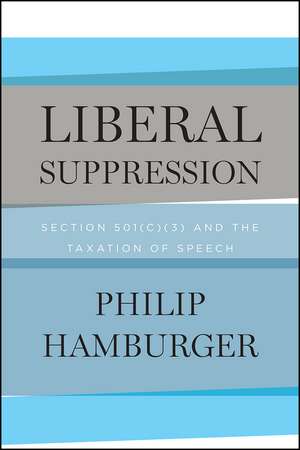Liberal Suppression: Section 501(c)(3) and the Taxation of Speech
Autor Philip Hamburgeren Limba Engleză Hardback – 9 apr 2018
In the course of exempting religious, educational, and charitable organizations from federal income tax, section 501(c)(3) of the Internal Revenue Code requires them to refrain from campaign speech and much speech to influence legislation. These speech restrictions have seemed merely technical adjustments, which prevent the political use of a tax subsidy. But the cultural and legal realities are more disturbing.
Tracing the history of American liberalism, including theological liberalism and its expression in nativism, Hamburger shows the centrality of turbulent popular anxieties about the Catholic Church and other potentially orthodox institutions. He argues persuasively that such theopolitical fears about the political speech of churches and related organizations underlay the adoption, in 1934 and 1954, of section 501(c)(3)’s speech limits. He thereby shows that the speech restrictions have been part of a broad majority assault on minority rights and that they are grossly unconstitutional.
Along the way, Hamburger explores the role of the Ku Klux Klan and other nativist organizations, the development of American theology, and the cultural foundations of liberal “democratic” political theory. He also traces important legal developments such as the specialization of speech rights and the use of law to homogenize beliefs. Ultimately, he examines a wide range of contemporary speech restrictions and the growing shallowness of public life in America.
His account is an unflinching look at the complex history of American liberalism and at the implications for speech, the diversity of belief, and the nation’s future.
Tracing the history of American liberalism, including theological liberalism and its expression in nativism, Hamburger shows the centrality of turbulent popular anxieties about the Catholic Church and other potentially orthodox institutions. He argues persuasively that such theopolitical fears about the political speech of churches and related organizations underlay the adoption, in 1934 and 1954, of section 501(c)(3)’s speech limits. He thereby shows that the speech restrictions have been part of a broad majority assault on minority rights and that they are grossly unconstitutional.
Along the way, Hamburger explores the role of the Ku Klux Klan and other nativist organizations, the development of American theology, and the cultural foundations of liberal “democratic” political theory. He also traces important legal developments such as the specialization of speech rights and the use of law to homogenize beliefs. Ultimately, he examines a wide range of contemporary speech restrictions and the growing shallowness of public life in America.
His account is an unflinching look at the complex history of American liberalism and at the implications for speech, the diversity of belief, and the nation’s future.
Preț: 324.82 lei
Preț vechi: 401.03 lei
-19% Nou
Puncte Express: 487
Preț estimativ în valută:
62.16€ • 65.03$ • 51.63£
62.16€ • 65.03$ • 51.63£
Carte indisponibilă temporar
Doresc să fiu notificat când acest titlu va fi disponibil:
Se trimite...
Preluare comenzi: 021 569.72.76
Specificații
ISBN-13: 9780226521947
ISBN-10: 022652194X
Pagini: 432
Dimensiuni: 152 x 229 x 33 mm
Greutate: 0.68 kg
Ediția:1
Editura: University of Chicago Press
Colecția University of Chicago Press
ISBN-10: 022652194X
Pagini: 432
Dimensiuni: 152 x 229 x 33 mm
Greutate: 0.68 kg
Ediția:1
Editura: University of Chicago Press
Colecția University of Chicago Press
Notă biografică
Philip Hamburger is the Maurice and Hilda Friedman Professor of Law at Columbia Law School. He is the author of The Administrative Threat, Is Administrative Law Unlawful?, Law and Judicial Duty, and Separation of Church and State.
Cuprins
Introduction
1. Conceptual Foundations
I. Group Speech and Liberal Fears
2. Idealistic Organizations in Politics
3. Liberal Democratic Anxieties
II. The Liberal Assault
4. Influence and Propaganda
5. Segregation
6. Subversion
7. Political Theory
III. Unconstitutional
8. The Force of Law
9. First Amendment Principles
10. Licensing and Wholesale Suppression
11. Government Interests
12. Other Avenues for Speech
13. Not Only Exemptions but Also Deductions
14. Distortions of Constitutional Doctrine
IV. Divided and Subdued
15. Rights of Associators and Associations
16. Fractions of Persons and Rights
17. Government Homogenization of Public Opinion
18. Contemporary Speech Restrictions
Conclusion
Notes
Index
1. Conceptual Foundations
I. Group Speech and Liberal Fears
2. Idealistic Organizations in Politics
3. Liberal Democratic Anxieties
II. The Liberal Assault
4. Influence and Propaganda
5. Segregation
6. Subversion
7. Political Theory
III. Unconstitutional
8. The Force of Law
9. First Amendment Principles
10. Licensing and Wholesale Suppression
11. Government Interests
12. Other Avenues for Speech
13. Not Only Exemptions but Also Deductions
14. Distortions of Constitutional Doctrine
IV. Divided and Subdued
15. Rights of Associators and Associations
16. Fractions of Persons and Rights
17. Government Homogenization of Public Opinion
18. Contemporary Speech Restrictions
Conclusion
Notes
Index
Recenzii
“While there are many books about the role of religion and politics and a large literature on the constitutional implications of tax exemptions and the regulation of nonprofits, none bring these topics together like Hamburger’s sophisticated, original, and compelling arguments. Hamburger persuasively argues that this seemingly modest provision in the tax code actually has important implications for constitutional law, religious freedom, and the development of American liberalism.”
“Liberal Suppression develops and argues vehemently for a point of view underrepresented in recent literature on the tax topics that it addresses. It will enliven and (in a good way) unsettle those debates.”
"Liberal Suppression is worth the read for anyone concerned about the limits of free speech in the United States today. There is hardly a more pressing concern at this moment in the nation’s history."
